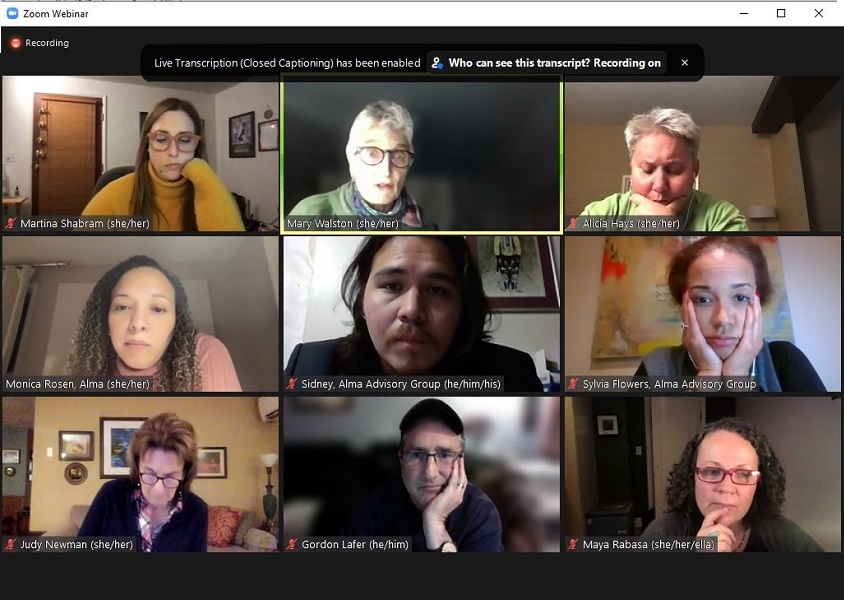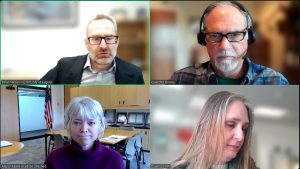4J School Board work session breaks down after ‘vitriol’ remark
7 min read
A glum 4J School Board considers how to move forward together after their work session ended unexpectedly Wednesday.
At the Eugene School Board Wednesday night, conducting a training about bias, consultant Monica Rosen.
[00:00:06] Consultant Monica Rosen: Mary, I wanted to invite you into the conversation. Is there anything you’d want to share?
[00:00:14] 4J School Board Member Mary Walston: Well, yes and no. I mean, there’s a whole bunch of stuff I want to share and comment on. I don’t know that this is the place, because we’re working with you to recruit and hire a superintendent. It seems like what we’re really touching on is a lot of deeper issues and the elephant in the room of what I did back in December.
[00:00:34] John Q: Mary had filed a complaint against two fellow school board members, Laural O’Rourke and Maya Rabasa. In mid-January she dropped the complaint.
[00:00:43] 4J School Board Member Mary Walston: So I don’t know that I want to comment on that here, but I guess, what I heard you say, Monica, is part of the reason that I did what I did, because complicit— to be silent is to be complicit. And I think I can agree with what other board members have said. I certainly understand the systemic issues that we have not already in our system, but the whole education system, our whole country is built on racism and inequality, I understand that intellectually. Obviously, my lived experiences are different than other people’s.
Thank you for supporting
local citizen journalism
[00:01:15] But what I would like to see us talk about, and again, this isn’t the spot to do it, is, let’s talk about the system injustices and let’s not focus on individuals and attacking individuals. That’s what bothers me and the vitriol, because I really do want to hear what people have to say. Tell me what your ideas are. Tell me how we’re going to solve this problem together.
[00:01:40] But when it’s just vitriol and this toxic attacking of people, it bothers me. And that’s why I felt compelled to speak up because silence, as you said, is complicity, I don’t want to say anything else at this point because I don’t want it to get us off track.
[00:01:58] Consultant Monica Rosen: Thank you, Mary. I appreciate that. And as we said, we’re going to expect and accept non-closure. And so I appreciate that everyone’s naming, there’s more work to do, and, hope that you’ll be able to come together to discuss those things. Thank you. And thank you, Mary, for sharing, bringing your voice into the conversation. So I’m going to come back now to what we want to be doing around bias and how our process mitigates bias.
[00:02:32] John Q: School board members realized that Laural was no longer in the meeting.
[00:02:36] 4J School Board Member Maya Rabasa: So, I know I identified that this is a challenge for me, so I apologize and I don’t necessarily need closure, but I do want to call attention to the fact that I believe some harm was just done. I’m seeing Laural has gone and I’m really uncomfortable with where that went and I’m seeing competency and evidence-based process and I’m kind of sitting here uncomfortable with a pretty bold statement that was made that really challenges the genuine place that Laural was coming from sharing. If we know anything about Laural, it’s that she’s incredibly straightforward. And to put words into her mouth feels, it feels as though there’s some harm that’s been caused and it makes me pause.
[00:03:29] Not because I need closure, because I’m not sure we will ever get there, but because it makes me concerned about moving forward with an interview process, when as a team, we’re not extending that courtesy to each other. And I just want to say that out loud. I don’t want Laural to have to say that, but I have some deep concerns about, without making assumptions, instead of extending grace to people and trusting that they’re communicating honestly, and straightforwardly and that there isn’t anything that’s being implied.
[00:04:12] It’s all being shared with vulnerability and with a desire to move in a forward direction, not in a backward one.
[00:04:26] Consultant Monica Rosen: Thank you, Maya. Thank you for sharing that. I appreciate you naming the discomfort and I’m just wondering if anyone has a response or reaction to what Maya is sharing.
[00:04:42] 4J School Board Member Maya Rabasa: I’m also really well with people sitting with my words. I don’t necessarily need a reaction. I honestly don’t expect one, so I appreciate you giving the opportunity, but I also want folks to know that my words can stand by themselves. They don’t necessarily need to be responded to. I’m working on that closure thing.
[00:05:11] 4J School Board Member Gordon Lafer: I also see Laural’s not in the room. I’m not sure that that’s because it’s cause we’ve been gone too long. I, when we talked about creating, what do we say? I don’t know, like ground rules, like how we’re going to go about this even if we disagree, it feels to me that characterizing somebody who’s speaking up about equity as ‘vitriol’ is one of the things I think would be good to avoid. We don’t have to get into it, but at some point we have to be able to go forward, I think, without that kind of thing.
[00:05:49] 4J School Board Chair Judy Newman: Well, I would like it if Laural returned. I don’t feel comfortable, in reflecting back on what was said and other conversations I’ve had with Laural, and what I’ve heard is that, the way Mary made her comments, I think Laural felt as if that was an attack. I don’t know, Maya. I mean, without Laural here, I don’t know. I think it’s an important conversation because I don’t know there was any intent for that at all. So, I don’t know where to go.
[00:06:32] Consultant Monica Rosen: Okay. Got it. I got it. So I’m sorry that we lost Laural. I see she’s not on the meeting anymore.
[00:06:41] 4J School Board Member Mary Walston: I just want to say there was no intent. I was just trying to express my feelings. Monica, you asked me to share, I said I was reluctant to do that, but I wanted to hear it. I wanted the group to know what I was thinking. I’m not trying to blame or characterize anybody. I’m just telling you how I feel and what my motivations were. And I really think this is not the place to talk about it because we’re here to talk about hiring a superintendent, not to work on our individual issues as a board. And so that was not my intent. I am sorry if Laural took it that way. We need to figure out what’s going on and work as a group. And that’s what I want to do. That’s that’s what I want to have the conversation about.
[00:07:23] Consultant Monica Rosen: Yeah. Oh, go ahead, Gordon.
[00:07:30] 4J School Board Member Gordon Lafer: I mean, I don’t know quite how to say this, but with all due respect, you can’t call somebody’s comments ‘vitriol,’ and then say you didn’t mean to characterize them. And I think that it’s true where we’re here to figure out how to hire a superintendent—
[00:07:43] 4J School Board Member Mary Walston: I did not call her ‘vitriol’. I said the remarks were vitriol. I never called her out specifically. So you need to understand what I was saying.
[00:07:50] 4J School Board Member Gordon Lafer: That’s what I said, her remarks, what she said. Did I get that wrong? Well, uh, I don’t know. I was about to say, obviously we’re here to hire a superintendent, but we’re talking about equity issues at some point, obviously relates to other things going on and how we work with each other.
[00:08:13] John Q: Later in the meeting, School Board member Maya Rabasa.
[00:08:16] 4J School Board Member Maya Rabasa: I don’t mean to sound like a broken record, and I know I’ve been asking the board to do this since, before I was even a board member, but I think that we would benefit from having some, some anti-racist training with Ayisha Elliott. I think that she does some wonderful training focused specifically on institutional racism. And I think that that starting at that point, is where we could begin to have the conversation that needs to happen. I think that— so that’s my recommendation for work that we could do and should do, especially considering a lot of the other work, even beyond hiring a superintendent.
[00:09:06] I think that that is really important. We hear over and over and over again, that presenting ourselves as a united front is what we need to do in order to pull in a superintendent. And I think that we all need to take responsibility for our roles in that breakdown. And I think unfortunately, sometimes it’s presented in a way, not just by us as a collective board or as individual board members, but even, messaging coming from the community that really lends itself to supporting the idea that by calling out that which we consider problematic, that that calling out is the point of a problem as opposed to the behavior that leads to something being called out.
[00:10:01] 4J School Board Chair Judy Newman: I’ve heard the expression ‘calling in’ and I think that’s what this board needs to do. I mean, it is identifying things, but it’s ‘calling it in’ with a commitment to figure this out together.






